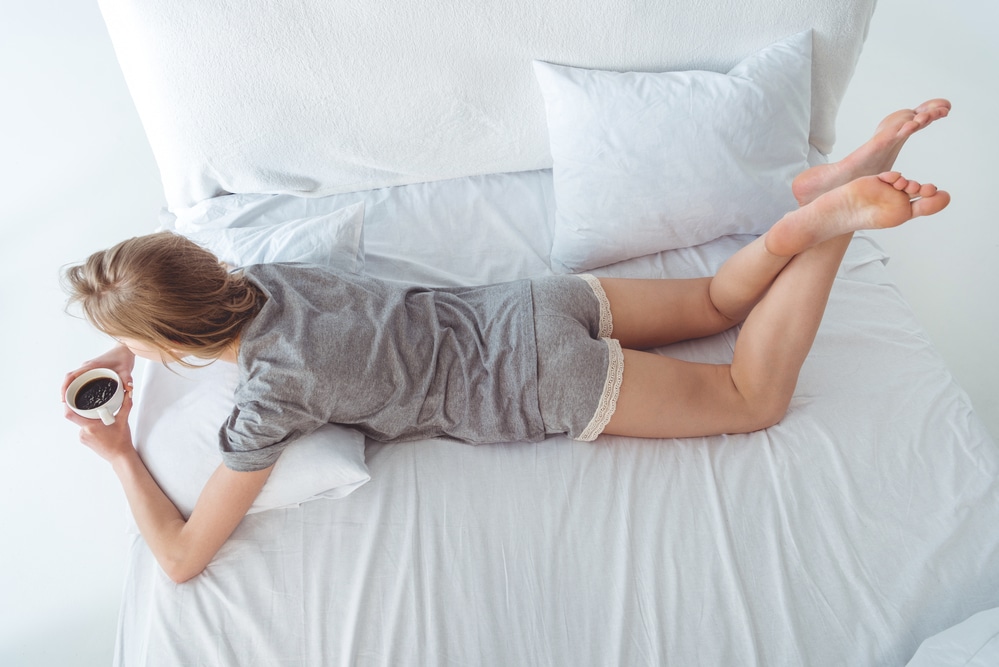When’s the last time you took a whole day just for yourself?
Between work, family, and other obligations, it’s hard to find time to simply relax and do nothing.
But believe it or not, scheduling a “do nothing” day has some powerful benefits for your mental, emotional, and physical health.
What Does It Mean To Do Nothing All Day?
A “do nothing day” is a scheduled day where you give yourself complete permission to relax, restore, and replenish without worrying about being productive.
You temporarily let go of all responsibilities – including household chores and self-improvement goals – for an entire day.
On your do nothing day, there is no need to accomplish anything or even leave your home (unless going out feels enjoyable and restorative to you). Let your spontaneous impulses guide you.
If you feel like lounging in bed binge watching a show – do it! If a mood strikes to spend 3 hours snuggled with a book or staring out the window or puzzling out a relaxing crossword, follow it where it leads.
Nap, snack, take a leisurely bubble bath, spend time in silence…allow yourself to fully indulge.
Any activity where the intention is resting, playing or tending to your emotional/spiritual needs qualifies for a do nothing day.
Let boredom become your friend, sparking creativity. If socializing appeals, get together with loved ones with no plan except enjoying their company.
The essence of a rewarding do nothing day: Listen deeply to your inner rhythms.
Follow your intuition toward whatever would feel nourishing right now. Then relax into it fully – without even a hint of hurry, productiveness or shoulds.

15 Reasons Why You Should Have A Do Nothing Day
1. Reduces Stress and Anxiety
Constant stress takes a major toll on your mind and body. By giving yourself permission to take a break from the pressures of everyday life, you give your nervous system a chance to reset. Taking time for quiet and stillness is profoundly calming.
2. Improves Sleep
Too much stimulation and activity can make it hard to wind down at night.
Using a do nothing day for rest and relaxation can help regulate your sleep-wake cycle, promote deeper sleep at night.
3. Sparks Creativity
When we’re constantly on busy mode, it’s hard for new ideas and creative insights to take root. The open, lazy rhythm of a do nothing day encourages your inventive juices to flow.
4. Enhances Focus and Concentration
After intense mental effort, your brain’s ability to focus suffers from fatigue.
By alternating hard work with complete inactivity, you give your cognitive capacities a chance rebuild.
5. Supports Emotional Health
Pressing pause on your usual routines creates space for you to check in with yourself at an emotional level. Allowing feelings to surface while having nowhere else to be can be deeply therapeutic.
6. Lowers Blood Pressure
Studies show that prolonged relaxation is effective at reducing blood pressure. An unstructured day devoted self-care can support heart health.
7. Boosts Immune System
Stress causes the body to produce immune-suppressing hormones like cortisol. Choosing rest over work strengthens your defenses against illness and infection.
8. Increases Sense of Calm and Peace
When you have no agenda except to go with the flow, your nervous system gets to tap into its native state – a feeling of expansive tranquillity.
Time moves slower and deeper.

9. Encourages Mindfulness
With no place to go and nothing on your to-do list, presence and awareness become effortless.
As thoughts settle, you connect with the richness of the here and now.
10. Improves Mood
Taking things easier has been scientifically shown to activate reward centers in the brain, triggering the production of feel-good neurotransmitters like serotonin and dopamine.
11. Allows Your Brain to Rest
Neural networks that don’t get a break from focused modes are prone to fatigue. Unplugging for a while lets your brain wander and refresh. New connections form.
12. Recharges Motivation
When you’re burned out, even activities you used to enjoy can feel like too much effort.
By restoring your energy reserves, do nothing days help summon your natural drive.
13. Helps Avoid Burnout
Pushing yourself without a break lowers productivity and puts you at risk for exhaustion.
Taking time off preemptively prevents the spiral of overdoing and crashing.
14. Strengthens Relationships
Using your free day to hang out with loved ones without any specific plans lets you focus wholly on bonding.
Conversation flows; closeness deepens.
15. Provides Sense of Freedom
So much of modern life is scheduled and structured. Honoring your basic human need for rest and play amidst the demands of routine fosters self-trust.

How to Not Feel Guilty for Doing Nothing All Day
It’s natural to feel some guilt or hesitation about taking a whole day “off” – especially when things feel busy.
Here are some tips to help you embrace the permission to temporarily shirk all duties with peace of mind:
Remember, it’s about balance. One unscheduled day doesn’t negate all your other days of committed hard work. Use the time to rest so you can show up recharged.
Focus on intention. Remind yourself: this day is meant for consciously replenishing your energy and creativity reserves. It serves a purpose!
Avoid the impulse to be productive. When ideas or urges to be active surface, gently set them aside for later. Challenge the urge to “accomplish” things.
Surrender control. Practice trusting that things will be okay without you micromanaging them for a day. The world won’t stop spinning!
Let go of guilt. If those nagging “shoulds” arise, take a few deep breaths. Remind yourself you deserve – and need – this break.
A Do Nothing Day Is Not A Waste Of Time
The next time you find yourself feeling overwhelmed or overly busy, consider setting aside a day to indulge your soul.
Avoid goal-setting or ambitious projects. There will be plenty of time for achieving later.
Give yourself full permission to step off the treadmill of responsibilities – even if just for 24 hours. You may rediscover simple but forgotten pleasures.







